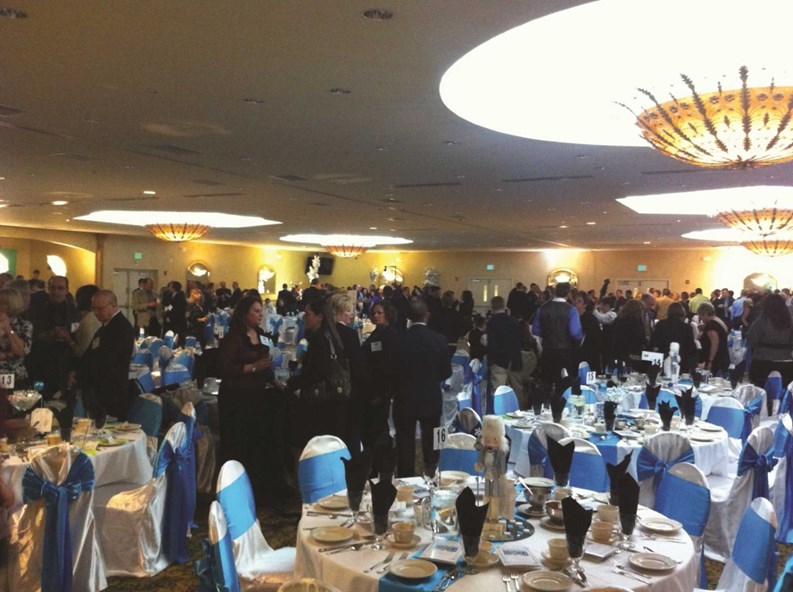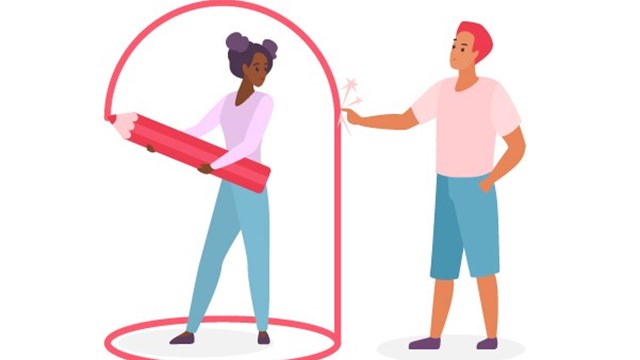The business of running a condo building or homeowners association—regardless of the size of the community—can often be complex. From interacting with vendors and service providers to handling conflicts between neighbors, managers and board members alike often feel like they could use some help, or just some friendly advice.
Aside from the publication you’re now holding, one of the best resources for managers and boards in the Chicagoland area is the Illinois chapter of the Community Associations Institute (CAI-Illinois), a group that exists solely to assist and advocate for the state’s community associations.
A Bit of History
As a national organization, CAI was founded in 1973 as “a multi-disciplinary non-profit alliance serving all stakeholders in community associations.” Today, CAI works to provide education and other resources to nearly a quarter-million condo, townhome, co-op and HOA communities, as well as the professionals serving them.
Nationally, about 62 million Americans live in homeowners associations, condominium communities, residential cooperatives and other planned communities. CAI has some 30,000 members in 60 state and regional chapters. Organization members include not just condominiums, homeowner associations, and other board-governed communities, but management firms, individual property managers, and homeowners themselves. Other members include real estate developers, mortgage lenders, legal and financial professionals, vendors and contractors, and public officials.
According to CAI-Illinois’ website, the group has an array of offerings and resources to help communities run more smoothly and efficiently, including education courses in a variety of formats for local board members, homeowners, managers, and other professionals. The group also offers accreditation programs for managers, and makes available CAI’s nationally-published books and guides on community association administration.
Closer to Home
According to CAI-Illinois, the chapter has over 1,100 members, including nearly 270 businesses, and more than 500 community association board members and unit owners representing over 100,000 homeowners. Amazingly, the CAI-Illinois chapter is run by less than a handful of people.
“We have currently just under 1,200 members, but the staff is just two full-time people and two part-time contractors. We run close to 50 events per year, take member phone calls and assist members to find the resources that they need. We also have about 13 committees and 150 volunteers who chair or staff those committees, all from within the industry. We are volunteer-run, and grateful for the time that the different companies and people put in to be able to really let the chapter do what we do best,”says CAI-Illinois president Andrea M. Sorgani.
The CAI-Illinois board is a 13-member group made up of homeowners, managers, accountants, lawyers and service providers. “It's really strictly out of the goodness of their hearts and the dedication that they have to the community associations and their professions,” that they do what they do, says Sorgani.
“We mostly serve people who live or work in homeowners associations,” says Sorgani. “So that means we look at our membership in three categories. The first would be homeowners or board members of associations. The second is community managers or management companies, and the third are business partners—which could be anybody who contracts with associations. So that group ranges from attorneys to pavers, roofers, painters, anybody who contracts with or provides services to a board or an association. We serve all three of those groups but they all work well together.”
“Our focus really is education and resources,” Sorgani continues. “The education portion of our organization has certainly grown. The resources we offer have expanded as well. We have a very, very active and busy legislative action committee in Illinois, the Illinois Legislative Action Committee or ILAC. And our organization works with lawyers and lobbyists so that we can be influential to make sure that the state legislature is passing laws that are in favor of people who are living in community associations.”
There’s absolutely no minimum- or maximum-size for an “ideal” CAI-member building or association, says Sorgani. “Single individuals can join CAI to gain the great benefits as well,” she says, “and both the smallest and the largest associations can gain crucial knowledge about running their association and building better.” In fact, says Sorgani, smaller associations in particular may find CAI helpful, especially if they don’t have a professional community association manager guiding them.”
Wide Range of Programming
One way CAI-Illinois helps its members and their communities is by offering a wide array of educational and accreditation courses for both managers and board members, covering topics ranging from legal issues to building rapport between boards and property managers.
“Courses enable members to meet other homeowners, and experts in the community association industry, and share experiences, ideas and solutions to common association problems,” says Sorgani, “and allows them to get answers to their own specific questions.” Recent seminar topics offered by the group include “Budgets and Reserves,” “12 Mistakes a Board Can Make—How to Prevent Them,” and “The ABC's of Community Associations,” which is a primer for new board members, as well as veterans looking to refresh their administrative knowledge.
Political Action
Another way CAI-Illinois serves its constituents is through political action. Through ILAC, CAI represents the interests of chapter members with respect to federal, state and local legislation and regulatory activities.
“Condominiums and other community associations are significantly affected by statutory changes,” says Sorgani. “State and local legislation can either solve current problems or significantly affect the operations and governance of community associations. It is crucial that CAI-Illinois’ position be considered by those making our laws in Illinois. ILAC is the primary voice for community associations in the Illinois legislature, and actively interacts with other organizations to achieve common goals. The committee is non-partisan and serves only to further the interests of the community association constituency.”
According to Sorgani, ILAC develops or comments on legislation for introduction in the Illinois legislature, and reviews, monitors, supports or opposes pending federal and state legislation and regulation. The committee takes a collective “position” on each bill, which is then conveyed to elected officials in Washington or Springfield. The committee also enlists the efforts of the chapter membership in influencing the course of proposed legislation through letter-writing and educational campaigns. The chapter also hosts legal forums each year to update chapter members on legal and legislative developments affecting community associations, and ILAC members often contribute articles to Common Interest magazine, a quarterly publication of CAI-Illinois. ILAC also is instrumental in monitoring growing trends and developing strategies to protect community associations, as well as promoting, communicating, and implementing CAI public policy at the state level.
At the moment, licensing of managers through what CAI-Illinois is calling the Community Association Manager Licensing and Disciplinary Act is drawing much of the group’s legislative attention, says Sorgani. [See sidebar for pending legislation].
“There are many bills affecting community associations in the legislature at any given time, but manager licensing is definitely a key one for us. We were very involved with it in terms of getting in front of people, making sure that the language was appropriate, and beneficial to associations.”
Manager Training & More
In its efforts to improve community association and residential management, CAI-Illinois offers property managers a wide array of core educational classes to enrich their skill set and give them more tools to work with.
Classes range from the M-100 course, which is a comprehensive community association management overview that is available as either a two-and-a-half-day seminar or as a home-study course, to a case study course, which is “...a comprehensive examination of an actual community association, combining classroom instruction with an extensive on-site inspection.”
Participants explore a community's profile in depth, meet with its manager, its board, and other key personnel, then generate a final narrative “case study” paper, covering the skills acquired in the all their previous courses. Other CAI-Illinois courses include Advanced Facilities Management, Association Communications, Community Governance, and Advanced Insurance & Risk Management, just to name a few.
The organization also hosts an annual conference and trade show for its members featuring educational presentations, legal seminars, and exhibitors from all corners of the industry. The 2011 two-day event will be held on Friday, January 28th and Saturday, January 29th at the Arlington Park Racetrack. Managers, homeowners, and industry members alike are all invited to attend. For more information and to register for the conference, visit the CAI-Illinois website at www.cai-illinois.org, or contact the Illinois chapter at 847-301-7505.
In addition to courses and the trade show, CAI-Illinois offers members and boards a wide array of resources via the organization’s website. “We have board member toolkits, sample documents for board members to use to understand their roles and responsibilities, or how to run a meeting. We also have a Q&A forum and other resources at our national website, many of which are free for our members. And then we also have a bookstore where people can buy things that might be more specific to the issues or the challenges in their own association.”
Joining Up, Looking Ahead
“I think the biggest challenge for our organization is having people know that we exist,” says Sorgani. “In some cases, we have many members who have been members for many, many years and their boards of their organizations are members, they put it in their budget, they attend our events and would never not be members. But there are so many people living in community associations in the state of Illinois who don't know about us. Boards change and addresses change, so our biggest challenge is being able to service more people. We certainly want to be able to provide resources when problems arise, but we also want to be able to be proactive and provide them education and resources to avoid some of those issues.”
Joining CAI-Illinois is easy, and within the means of even the smallest co-op, condo or townhouse community, says Sorgani. A year’s membership costs $105 for a single board member, $55 for a second board member and $45 for all additional board members. “With the discounts you'll receive on seminars and publications, the free magazine subscriptions, and the expert information you'll get on basic and advanced community association issues, you can't afford NOT to join,” she says. “In fact, most of our community association members value CAI so highly, they put CAI's membership dues expense right into their budget.”
CAI members also receive subscriptions to Common Interest and Common Ground magazines plus access to CAI-Illinois’ library of resources with topics ranging from satellites to running effective meetings. For more information about joining CAI, including cost, benefits of membership, and how to join, check out the organization’s website at www.caionline.org, or give their membership office a call.
“Just last year, we've made some very tough decisions and some very big changes that, for the most part, we're transparent to our members,” says Sorgani, “but operationally, we have rebuilt and fortified our foundation so that we can better serve our current members and serve more members, while still remaining a lean, volunteer-run organization.”
“In most cases, people's homes are their single largest asset,” Sorgani concludes, “and we believe that that should be protected. Anybody involved in running a community should have certain criteria that they meet, and we can provide the resources that are needed.”
Hannah Fons is associate editor of The Chicagoland Cooperator. Additional reporting by editorial assistant David Chiu.







Leave a Comment